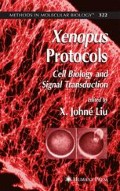Abstract
Events controlling cell division are governed by the degradation of different regulatory proteins by the ubiquitin-dependent pathway. In this pathway, the attachment of a polyubiquitin chain to a substrate by an ubiquitin-ligase targets this substrate for degradation. Xenopus egg extracts present many advantages for the study of the cell cycle, including the availability of a large quantity of material synchronized at a particular phase of the cell cycle. In this chapter, we describe various protocols used in Xenopus egg extracts to study the ubiquitination and degradation of different cell cycle regulators. We first provide the method used to obtain interphase- and metaphase II-arrested egg extracts. Subsequently, we describe the protocol employed in these extracts to test the putative ubiquitination and degradation of a protein. Moreover, we describe a detailed practical procedure to test the role of different regulators in the ubiquitin-dependent degradation pathway of a specific protein. To that, we show how to eliminate some of these regulators from the extracts by immunodepletion and how to activate ectopically their function by the translation of their messenger ribonucleic acid. Finally, the Notes provide a series of practical details that explain the different problems that can occur and the possible solutions used to overcome them.
Access this chapter
Tax calculation will be finalised at checkout
Purchases are for personal use only
References
Flemming, W. (1965) Contributions to the knowledge of the cell and its vital processes. Part II. J. Cell Biol. 25, 3–69.
Lohka, M. J. and Masui, Y. (1983) Formation in vitro of sperm pronuclei and mitotic chromosomes induced by amphibian ooplasmic components. Science 220, 719–721.
Hershko, A. and Ciechanover, A. (1998) The ubiquitin system. Annu. Rev. Biochem. 67, 425–479.
Beers, E. P. and Callis, J. (1993) Utility of polyhistidine-tagged ubiquitin in the purification of ubiquitin-protein conjugates and as an affinity ligand for the purification of ubiquitin-specific hydrolases. J. Biol. Chem. 268, 21,645–21,649.
Scheffner, M., Huibregtse, J. M., and Howley, P. M. (1994) Identification of a human ubiquitin-conjugating enzyme that mediates the E6-AP-dependent ubiquitination of p53. Proc. Natl. Acad. Sci. USA 91, 8797–8801.
Tamura. T., Tanaka, K., Tanahashi, N., and Ichihara, A. (1991) Improved method for preparation of ubiquitin-ligated lysozyme as substrate of ATP-dependent proteolysis. FEBS Lett. 292, 154–158.
Castro, A., Peter, M., Lorca, T., and Mandart, E. (2001) c-Mos and cyclin B/cdc2 connections during Xenopus oocyte maturation. Biol. Cell 93, 15–25.
Losada, A., Hirano, M., and Hirano, T. (2002) Cohesin release is required for sister chromatid resolution, but not for condensin-mediated compaction, at the onset of mitosis. Genes Dev. 16, 3004–3016.
Cuvier, O. and Hirano, T. (2003) A role of topoisomerase II in linking DNA replication to chromosome condensation. J. Cell Biol. 160, 645–655.
Moore, J. D., Kirk, J. A., and Hunt, T. (2003). Unmasking the S-phase-promoting potential of cyclin Bl. Science 300, 987–990.
Vashee, S., Cvetic, C, Lu, W., Simancek, P., Kelly, T. J., and Walter, J. C. (2003) Sequence-independent DNA binding and replication initiation by the human origin recognition complex. Genes Dev. 17, 1894–1908.
Castro, A., Vigneron, S., Bernis, C, Labbe, J. C, Prigent, C, and Lorca, T. (2002) The D-Box-activating domain (DAD) is a new proteolysis signal that stimulates the silent D-Box sequence of Aurora-A. EMBO Rep. 3, 1209–1214.
Castro, A., Arlot-Bonnemains, Y., Vigneron, S., Labbe, J. C, Prigent, C, and Lorca, T. (2002) APC/Fizzy-related targets Aurora-A kinase for proteolysis. EMBO Rep. 3, 457–462.
Home, M. M. and Guadagno, T. M. (2003) A requirement for MAP kinase in the assembly and maintenance of the mitotic spindle. J. Cell Biol. 161, 1021–1028.
Reimann, J. D. and Jackson, P. K. (2002) Emil is required for cytostatic factor arrest in vertebrate eggs. Nature 416, 850–854.
Lorca, T., Castro, A., Martinez, A. M., et al. (1998) Fizzy is required for activation of the APC/cyclosome in Xenopus egg extracts. EMBO J. 17, 3565–3575.
Castro, A., Vigneron, S., Bernis, C, Labbe, J. C, and Lorca, T. (2003) Xkid is degraded in a D-box, KEN-box, and A-box-independent pathway. Mol. Cell Biol. 23, 4126–4138.
Murray, A. W. and Kirschner, M. W. (1989) Cyclin synthesis drives the early embryonic cell cycle. Nature 339, 275–280.
Funabiki, H. and Murray, A. W. (2000) The Xenopus chromokinesin Xkid is essential for metaphase chromosome alignment and must be degraded to allow anaphase chromosome movement. Cell 102, 411–424.
Glotzer, M., Murray, A. W., and Kirschner, M. W. (1991) Cyclin is degraded by the ubiquitin pathway. Nature 349, 132–138.
Zou, H., McGarry, T. J., Bernal, T., and Kirschner, M. W. (1999) Identification of a vertebrate sister-chromatid separation inhibitor involved in transformation and tumorigenesis. Science 285, 418–422.
Cohen-Fix, O., Peters, J. M., Kirschner, M. W., and Koshland, D. (1996) Anaphase initiation in Saccharomyces cerevisiae is controlled by the APC-dependent degradation of the anaphase inhibitor Pds1p. Genes Dev. 10, 3081–3093.
Pfleger, C. M. and Kirschner, M. W. (2000) The KEN box: an APC recognition signal distinct from the D box targeted by Cdh1. Genes Dev. 14, 655–665.
Yamano, H., Gannon, J., and Hunt, T. (1996) The role of proteolysis in cell cycle progression in Schizosaccharomyces pombe. EMBO J. 15, 5268–5279.
Visintin, R., Prinz, S., and Amon, A. (1997) CDC20 and CDH1: a family of substrate-specific activators of APC-dependent proteolysis. Science 278, 460–463.
Author information
Authors and Affiliations
Editor information
Editors and Affiliations
Rights and permissions
Copyright information
© 2006 Humana Press Inc., Totowa, NJ
About this protocol
Cite this protocol
Castro, A., Vigneron, S., Bernis, C., Labbé, JC., Lorca, T. (2006). Ubiquitin-Mediated Protein Degradation in Xenopus Egg Extracts. In: Liu, X.J. (eds) Xenopus Protocols. Methods in Molecular Biology™, vol 322. Humana Press. https://doi.org/10.1007/978-1-59745-000-3_16
Download citation
DOI: https://doi.org/10.1007/978-1-59745-000-3_16
Publisher Name: Humana Press
Print ISBN: 978-1-58829-362-6
Online ISBN: 978-1-59745-000-3
eBook Packages: Springer Protocols

